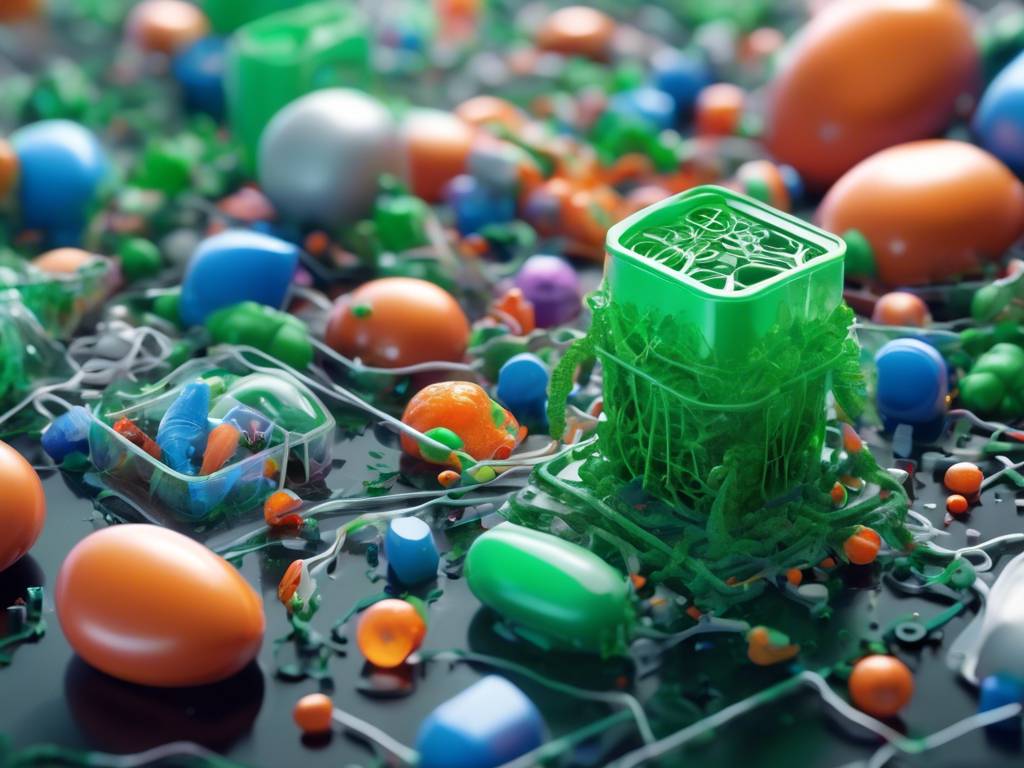Revolutionizing Plastic Waste with AI-designed Enzymes
Landfills worldwide are inundated with plastic waste, presenting a pressing environmental crisis. Protein Evolution, led by innovator Jonathan Rothberg, has devised a groundbreaking solution that leverages artificial intelligence (AI) to address the issue. By creating enzymes that can break down plastics, the company aims to revolutionize the recycling landscape.
The Process of Enzymatic Biodegradation 🔄
Within Protein Evolution’s laboratory at an old gun factory in New Haven, Connecticut, plastic waste is subjected to intense heat, resulting in a molten substance that is subsequently solidified. This material, comprising discarded textiles and industrial scraps, is then finely ground to maximize its surface area. The ultimate goal is to transform it into food for specially designed AI-engineered enzymes.
- Enzyme Creation
- Enzyme Design with AI Assistance
- Enzyme Feeding and Breakdown in Reactor
The Promise and Potential of Enzymatic Recycling ♻️
Protein Evolution’s chief technology officer, Jay Ketka, humorously envisions feeding the enzyme-treated plastic to “Sharks” (enzymes) in a reactor filled with water. These enzymes facilitate the disintegration of plastics into their core components, resulting in a material referred to as “biopure.” This biopure substance, akin to polyester derived from petroleum, can be utilized in fabrics, offering a sustainable alternative to traditional manufacturing processes.
- Plastics Crisis Overview
- Advantages of Enzymatic Recycling
Challenges and Opportunities in Plastic Recycling 🌍
The global plastic pollution crisis underscores the urgency of implementing sustainable waste management practices. With an annual production of approximately 460 million tons of plastic, only a minuscule 9% is effectively recycled. This alarming statistic highlights the critical need to explore innovative solutions, such as enzymatic recycling, to combat environmental degradation.
- Current State of Plastic Recycling
- Potential Applications of Enzymatic Recycling
The Role of AI in Enzyme Engineering 🧬
Protein Evolution’s pioneering approach amalgamates AI technology with biochemical innovation. By harnessing AI algorithms to analyze vast protein datasets, the company generates novel amino acid sequences that constitute the basis for designing new enzymes. Cutting-edge tools, including Google DeepMind’s AlphaFold, enable Protein Evolution to predict protein structures and identify high-potential enzyme candidates for laboratory testing.
- Innovative Enzyme Design Process
- Impact of AI on Biodegradation Efficiency
Scaling Up and Commercialization 🚀
Protein Evolution’s ambitious vision involves establishing pilot plants to produce 300 tons of recycled plastic annually by 2025, subsequently scaling up to a commercial facility with a capacity of 50,000 tons per year by 2028. While the company has secured substantial venture funding and development partnerships with renowned brands like Stella McCartney, transitioning to large-scale production entails navigating logistical and financial challenges.
- Commercialization Strategy
- Risks and Opportunities in Scaling Up
Hot Take: Embracing Sustainability through AI-powered Innovation
Embracing technological advancements in enzyme design holds immense potential for revolutionizing plastic recycling and mitigating environmental damage. Protein Evolution’s AI-enabled approach not only champions sustainability but also signifies a paradigm shift in waste management practices. By fostering collaboration between science, technology, and industry, we can pave the way for a greener and more sustainable future.





 By
By
 By
By



 By
By